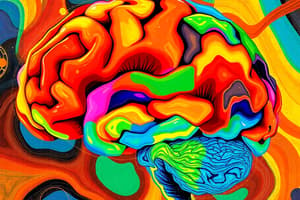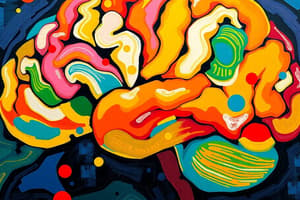Podcast
Questions and Answers
What is the primary function of the hippocampus in relation to memory?
What is the primary function of the hippocampus in relation to memory?
- Generating procedural memories
- Recalling past experiences
- Facilitating the consolidation of memories (correct)
- Storing long-term memories
Which type of amnesia involves an inability to form new memories after a brain injury?
Which type of amnesia involves an inability to form new memories after a brain injury?
- Retrograde amnesia
- Dissociative amnesia
- Anterograde amnesia (correct)
- Infantile amnesia
What best describes the effect of sleep on memory consolidation?
What best describes the effect of sleep on memory consolidation?
- It interferes with memory recall.
- It decreases the effectiveness of spaced practice.
- It has no effect on memory processes.
- It improves learning and recall significantly. (correct)
Which of the following memory types remains intact in cases of amnesia as described?
Which of the following memory types remains intact in cases of amnesia as described?
What is true about the 'spaced practice' method of studying?
What is true about the 'spaced practice' method of studying?
What distinguishes fast learning facilitated by the hippocampus from slow learning in the cortex?
What distinguishes fast learning facilitated by the hippocampus from slow learning in the cortex?
In the context of memory retrieval, what are the three essential components?
In the context of memory retrieval, what are the three essential components?
Which symptom is characteristic of semantic dementia?
Which symptom is characteristic of semantic dementia?
What does the term 'double dissociation' refer to in cognitive psychology?
What does the term 'double dissociation' refer to in cognitive psychology?
What is a key characteristic of retention in slow learning associated with the cortex?
What is a key characteristic of retention in slow learning associated with the cortex?
Flashcards
Hippocampus's role in memory
Hippocampus's role in memory
The hippocampus plays a crucial role in forming new episodic memories, essentially acting as a temporary memory hub that creates links between brain regions for future consolidation.
Anterograde Amnesia
Anterograde Amnesia
A condition where an individual loses the ability to create new long-term memories after the event that caused the amnesia. The ability to make new memories is impaired.
Consolidation (memory)
Consolidation (memory)
The process of converting short-term memories into more permanent, long-term memories by strengthening neural connections.
Fast Learning System
Fast Learning System
Signup and view all the flashcards
Slow Learning System
Slow Learning System
Signup and view all the flashcards
Sleep and Memory Consolidation
Sleep and Memory Consolidation
Signup and view all the flashcards
Spaced vs. Massed Practice
Spaced vs. Massed Practice
Signup and view all the flashcards
Retrieval Practice Effect
Retrieval Practice Effect
Signup and view all the flashcards
Lesion Method
Lesion Method
Signup and view all the flashcards
Double Dissociation
Double Dissociation
Signup and view all the flashcards
Study Notes
Hippocampus and Memory
- The hippocampus is crucial for memory, particularly in encoding new episodic memories.
- Damage to the hippocampus can lead to anterograde amnesia (inability to form new memories after the injury).
- HM, a patient with epilepsy, had his hippocampus removed and experienced significant anterograde amnesia, but preserved short-term memory (STM) and procedural memory.
- Amnesia can also affect retrograde memory (pre-injury recall) and the process of memory consolidation.
Memory Consolidation
- Consolidation is the process of stabilizing new memories into long-term storage.
- Anterograde amnesia demonstrates that memories are not maintained without consolidation.
- Retrograde amnesia suggests that existing memories might not be fully consolidated at the time of injury.
- The hippocampus creates temporary links between different brain regions to facilitate slow learning and consolidation.
- Factors like learning speed, reduced forgetting, and effective storage are crucial in consolidation.
Complementary Learning Systems
- Fast learning, associated with the hippocampus, involves quick acquisition but rapid forgetting, disorganized storage, and poor generalization.
- Slow learning, occurring in the cortex, involves integration with existing knowledge, leading to slow forgetting, efficient storage, good generalization, and requiring many repetitions.
Sleep and Consolidation
- Sleep plays a vital role in memory consolidation, improving learning and recall.
- During sleep, the hippocampus reactivates memories, transferring them for further processing in the cortex.
- Sleep disruption can negatively impact memory consolidation through more interference and disruption to LTP (Long-Term Potentiation).
- The hippocampus drives memory reactivation during sleep for better interleaved learning.
Practice and Memory Consolidation
- Spaced practice (spreading learning over time) is more effective for memory consolidation than massed practice (concentrating learning close together in time).
- Spaced repetition demonstrably improves consolidation.
Memory Retrieval
- Memory retrieval involves three components: encoding (temporary storage), consolidation (long-term storage), and retrieval (accessing stored information).
- Retrieval practice, like repeated recall, improves memory retention and consolidation.
- Different recall intervals (e.g., immediate recall vs. recall after a week) show varying effectiveness of memory retrieval techniques.
Lesion Studies
- Lesion studies involve observing the effects of brain damage on cognitive function, focusing on specific areas and behaviours.
- Early studies in the field of neuroscience contrasted associationism (specific functions linked to specific locations) to holism (the brain functions as a whole).
- Double dissociation, like Broca's and Wernicke's aphasia demonstrates that different functions are tied to different areas.
Double Dissociation in Memory
- Semantic dementia involves a gradual loss of semantic knowledge without affecting other memory skills.
- HM's anterograde amnesia illustrates a clear double dissociation for episodic and semantic memory.
Brain Stimulation Methods
-
Non-invasive techniques like transcranial magnetic stimulation (TMS) allow for studying brain regions in humans without surgery.
-
Invasive techniques (like direct brain stimulation during surgery) provide precise insight into brain-behaviour relationships.
Studying That Suits You
Use AI to generate personalized quizzes and flashcards to suit your learning preferences.




